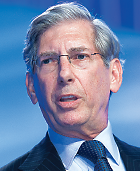What It Means to Be President

At this year’s annual meeting in San Francisco, I found myself moved by a normally routine ceremony over which the president-elect presides: administering the pledge to the new group of Distinguished Fellows. It’s the one that begins: “I WILL FAITHFULLY DEDICATE MYSELF ABOVE ALL TO THE WELFARE OF MY PATIENTS; TO MAINTAIN THE DIGNITY OF MY PROFESSION AND THE PRACTICE OF MEDICINE…”
These words, which I and many other psychiatrists have spoken perfunctorily in the past, seemed especially resonant. This was partly because of the realization that I was about to actually take on the weighty responsibility of the APA presidency. But, mostly, it was that the words of the pledge reminded me about the current challenges facing the field of psychiatry. We live in a time of undelivered health care reform, continuing stigma, wanton criticism of psychiatry and APA, and an enormous burden of illness caused by mental illness and unmet clinical need for treatment. Under these circumstances, it is very hard to remind the public—and even ourselves—that we are living in a moment of unprecedented scientific progress and with an array of therapeutic interventions with extraordinary effectiveness.
It is easy to lose sight of these positive aspects of our discipline because of the trying times in which we find ourselves. The enduring effects of the economic recession continue to bludgeon mental health budgets and restrict reimbursement for services. Tragic civilian massacres have focused attention on mental illness and violence, but not, so far, in a constructive way. And DSM-5 has been the target of criticism, aided and abetted by the media, and a lightning rod for antipsychiatry attacks.
These developments could not have been entirely foreseen by any of us. And they certainly were not what we signed up for when we decided to pursue a career in psychiatric medicine.
The reality is that the treatment of mental illness has been and remains a health care disparity despite the passage of the Mental Health Parity and Addiction Equity Act and the imminent implementation of the Patient Protection and Affordable Care Act. In addition, the stigma directed at mental illness and psychiatry continues to be perpetuated by the media disseminating exploitative and misleading information. For these and other reasons, now more than ever it is time for psychiatrists, and led by APA, to stand up for our patients and our field. We have the scientific momentum, public-health imperative, and moral high ground. We must not be defensive or even timid and must raise the awareness of the public and our colleagues in the medical profession about the true nature and inherent value of psychiatric treatment and mental health care.
So while on one hand I have a healthy dose of frustration and outrage, on the other hand I am very optimistic and bullish on our profession.
Consequently, on that day, at that moment, the words of the pledge that we recited had a clear and special meaning. I suddenly realized that the best strategy to respond to the challenges and criticisms that we faced was to rededicate ourselves to the principles and values that inspired our profession and that the pledge of Distinguished Fellowship beautifully articulated these precepts. Therefore, I ask that you reread the pledge below and join me in rededicating ourselves to trying to live up to its ideals. ■
“I WILL FAITHFULLY DEDICATE MYSELF ABOVE ALL TO THE WELFARE OF MY PATIENTS; TO MAINTAIN THE DIGNITY OF MY PROFESSION AND THE PRACTICE OF MEDICINE; TO SUPPLEMENT MY OWN JUDGMENT WITH THE WISDOM AND COUNSEL OF SPECIALISTS IN FIELDS OTHER THAN MY OWN; TO RENDER ASSISTANCE WILLINGLY TO MY OWN COLLEAGUES; TO BE GENEROUS IN GIVING PROFESSIONAL AID TO THE UNFORTUNATE; TO ENHANCE MY KNOWLEDGE BY CONTINUING STUDY, BY ATTENDANCE AT MEETINGS OF MY PROFESSIONAL COLLEAGUES, BY ASSOCIATION WITH PHYSICIANS OF EMINENCE, AND BY FREELY EXCHANGING EXPERIENCE AND OPINION WITH MY COLLEAGUES. I FURTHER PLEDGE TO AVOID COMMERCIALISM IN MY PROFESSIONAL LIFE; TO REFRAIN FROM SEEKING THE PUBLIC EYE FOR SELF AGGRANDIZEMENT; TO SET FEES COMMENSURATE WITH MY SERVICES AND ADJUST THEM TO THE CIRCUMSTANCES OF MY PATIENTS; AND TO AVOID ANY FINANCIAL PRACTICE WHATSOEVER THAT MIGHT DEBASE MY PROFESSION.”



